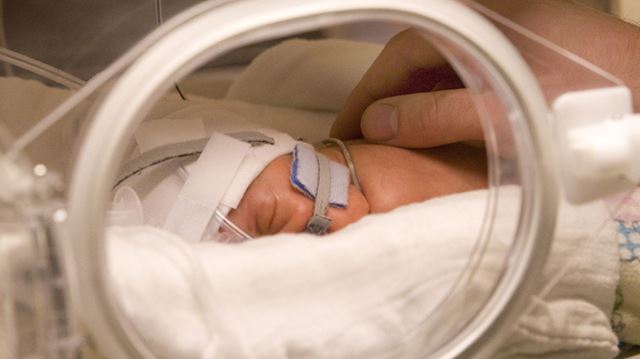
Hamilton Spectator
St. Joseph's Healthcare is reassessing a
cost-cutting plan to have lower-paid and less-educated nurses look after
sick and premature babies in the special care nursery.
"In relation to some issues that have come
forward we have listened and are pausing," said Winnie Doyle,
vice-president of clinical services and chief nursing executive. "We
will review and see if there is anything we've missed or haven't taken
into account and we'll make a decision."
The Ontario Ministry of Health asked for the
data behind the decision to replace four registered nurses certified in
neonatal care with registered practical nurses without specialty
training.
"Obviously there have been strong
reactions," said St. Joseph's CEO Kevin Smith. "We're just making sure
we're doing all the right things."
Concerns were raised by the Registered
Nurses' Association of Ontario, which is a professional body, and the
Ontario Nurses' Association, which is the union.
"We have to put a stop to things that are
simply dangerous to patients," said CEO Doris Grinspun of the RNAO.
"There is a limit."
Grinspun cut a vacation short when The
Spectator reported March 4 that St. Joseph's was believed to be the
first hospital in Ontario to add RPNs to the staffing mix in its Level 2
nursery, which cares for babies born up to eight weeks early, need help breathing or require intravenous therapy.
"I saw the front page of The Hamilton
Spectator and I went berserk," she said. "We went to the ministry right
away … It shocks me a nurse leader would support this or the CEO."
She says RNAO was already voicing concerns
to the ministry about Ontario hospitals balancing their budgets by
replacing some RNs with RPNs on medical and surgical floors when St.
Joseph's "took it up another notch."
"Here is where we draw the line in the
sand," she said. "Babies who need to be in a neonatal intensive care
unit are very fragile. They can change in a minute. They can aspirate
while feeding. They can have cardiac arrest."
She says the association demanded immediate action because "we can't wait even one day."
Under Ontario regulations, RPNs have college
diplomas and work with stable and predictable patients while RNs get
university degrees and care for sicker and more complex patients.
The hospital planned to move from having
five specialized nurses staff the unit at any one time to four certified
RNs and one RPN in July. Doyle said the RPN would look after stable
babies such as those apprehended by a children's aid society or
transferred from a Level 3 NICU. The Registered Practical Nurses
Association of Ontario said it was appropriate as long as there is a
"lower level of acuity with more predictable outcomes."
But the nursing union argues there is no
guarantee there will be enough stable babies in the nursery at any one
time and points out their conditions can change rapidly. In addition,
the nurses attend deliveries, leaving the nursery with fewer staff.
The final decision is expected to be made as
close to the beginning of the fiscal year April 1 as possible.
"The clock is ticking," said Smith about the
need to find $26 million in cuts to balance the $550 million budget by
March 31, 2017. Ontario's hospitals got their first base funding
increase in five years with a $345 million boost in February's
provincial budget. But it is not enough to stop planned cuts at St.
Joseph's and Hamilton Health Sciences.
RNs are much more expensive for the hospital
making between $31.02 and $44.84 an hour while a job posting for an RPN
at St. Joseph's Hospital listed the pay as between $26.83 and $29.15 an
hour.
"This is the tip of the iceberg," said Grinspun. "You will see more coming."
jfrketich@thespec.com
905-526-3349 | @Jfrketich
http://www.thespec.com/news-story/6381890-st-joe-s-backs-down-on-replacing-neonatal-rns-with-rpns/
